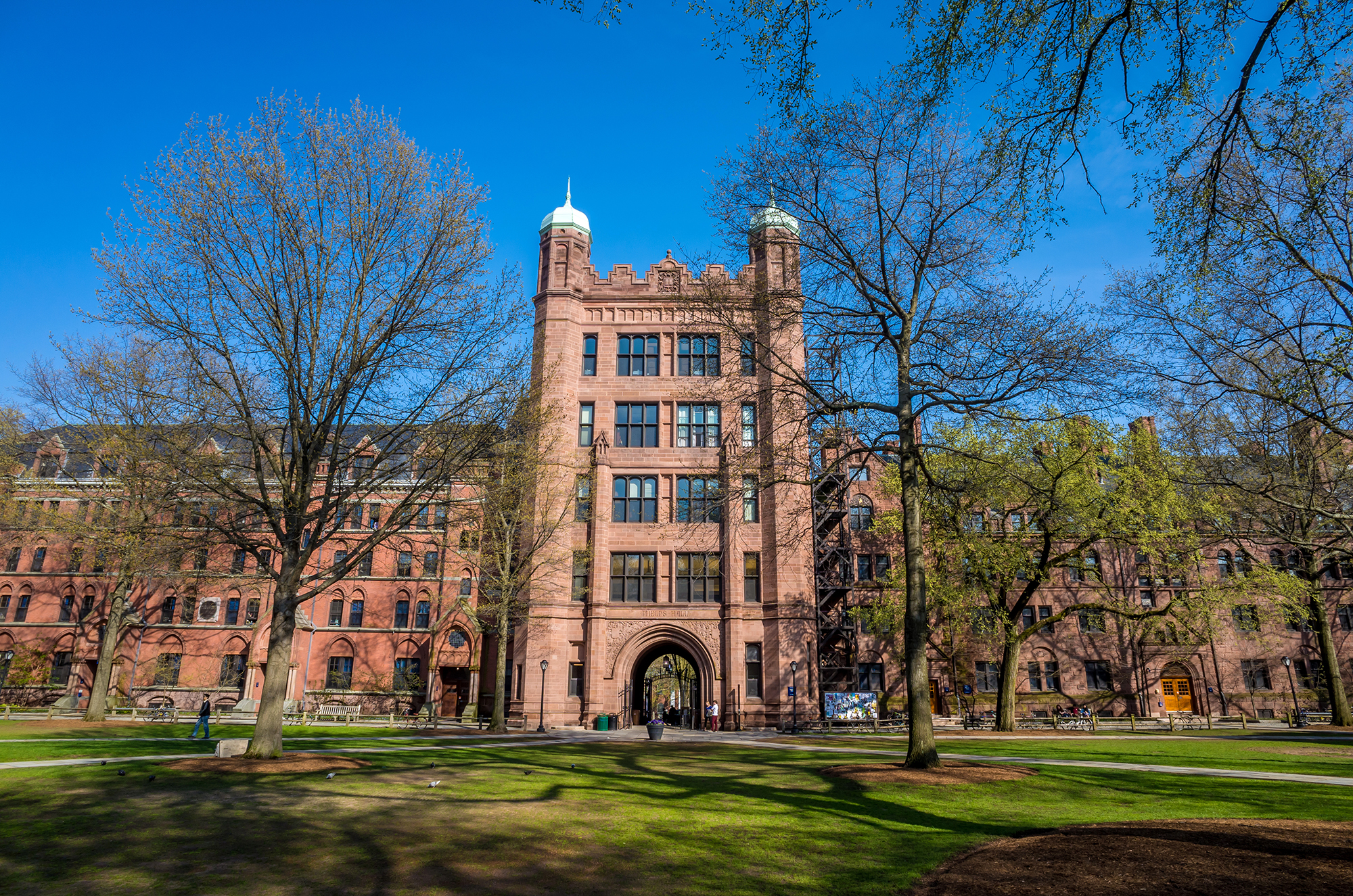School vs. School: Yale SOM or SC Johnson Cornell?

Deciding which school you’ll attend for your MBA isn’t easy. There are many factors that come into play when choosing the best school for you. You might be most concerned about where and what you want to study, or you could care more about reputation, alumni network, ROI, or even the application process.
Unfortunately, this comparison process can get quite tricky when looking at two very similar schools. To help you out, our School vs. School series does the heavy lifting for you. Take a look at two of the best b-schools Yale SOM and SC Johnson Cornell to see which is best for you.
Yale vs. Cornell: Location
Yale SOM is located in New Haven, Connecticut while SC Johnson Cornell is in Ithaca, New York. In both instances, the schools are located in smaller towns where one-of-a-kind shops, boutiques, and activities rule the day. Neither location is a place where an MBA would look for a job post-graduation, but both are just a little ways outside of New York City. New Haven is under two hours away by car while Ithaca is around four hours away.
As for which town is better:
- Cost of Living: Ithaca is 2 percent less expensive than New Haven.
- Housing: Ithaca housing costs 34.4 percent more.
- Education: New Haven spends 4 percent less per student, and the student to teacher ratio is 17.3 percent higher in New Haven.
- Commute: New Haven residents commute 42 percent more than residents of Ithaca.
- Jobs: Future job growth for New Haven is 19.38 percent compared to Ithaca, which is only 2.24 percent. Both are lower than the entire U.S., which is 30.54 percent.
Overall, Ithaca is a more affordable place to live, but you’re less likely to find a job in Ithaca after graduation.
Yale vs. Cornell: Rankings
Yale SOM and SC Johnson Cornell are both top business schools in the world. Each ranks highly across all publications with Yale SOM just edging out SC Johnson Cornell in most rankings.
Yale and Cornell School Rankings
| Publication | Yale SOM | SC Johnson Cornell |
|---|---|---|
| U.S. News & World Report | 11 | 15 |
| The Economist (Global) | 14 | 17 |
| Financial Times (Global) | 11 | 27 |
| Forbes | 13 | 10 |
| Bloomberg Businessweek | 12 | 11 |
Yale vs. Cornell MBA: The Cost
Each business school costs about the same on a per-year basis. Tuition is not even $3,000 more at Yale, and when you add on the increased cost-of-living, Yale is just $5,000 more per year than Cornell. Where Cornell saves the most is in housing and food, which is only $16,800 a year compared to Yale’s distressing $22,214.

When it comes to living on campus, Yale students are emptying their wallets more, paying an average annual rate of more than $22,000.
However, when it comes to funding, Yale SOM wins. One in every two Yale SOM MBA students earns a merit scholarship. Even better 29 Yale MBA students end up with full-tuition scholarships. On the other hand, only 30 percent of Cornell SC Johnson students receive some scholarship assistance. However, there are many full-tuition scholarships available including 25 Park Leadership Fellowships.
Yale and Cornell School Costs
| Cost | Yale SOM | SC Johnson Cornell |
|---|---|---|
| Tuition | $72,350 | $69,440 |
| Full Cost | $100,274 | $95,340 |
Yale vs. Cornell: Post-Graduation Employment
When it comes to post-graduation, both Yale SOM and Cornell SC Johnson MBA students can expect many opportunities for success. About 94 percent of Cornell MBA students and 91.9 percent of Yale SOM graduates have a full-time job offer three months after graduation.
Those graduates enter a range of industries with the top industries being consulting, finance, and technology. Consulting was the top industry at Yale SOM whereas Cornell students preferred finance. In both cases, most students chose to stay in the Northeast U.S. with 55 percent of Cornell graduates staying in the area and 48 percent of Yale graduates.
Yale vs. Cornell Employment
| Industry | Yale SOM | SC Johnson Cornell |
|---|---|---|
| Consulting | 34.9% | 22% |
| Finance | 23.1% | 29% |
| Tech | 14.9% | 18% |
As for post-graduation salary, both schools are on par with each other. Graduates can expect to earn slightly over $125,000 after graduation with a bonus of around $30,000.
Yale vs. Cornell Salary
| Salary | Yale SOM | SC Johnson Cornell |
|---|---|---|
| MBA Graduate Median Base Salary (2018) | $127,100 | $126,353 |
| Median Signing Bonus | $30,000 | $33,503 |
Inside Yale SOM
Located in New Haven, Connecticut, Yale SOM is one of the top business school’s in the country. Its proximity to New York City means that MBA students have access to many highly coveted networking, partnership, and placement opportunities in one of the business hubs of the world. Its programs are ranked in the top 15 in the world across all international and U.S.-based MBA rankings, regularly placing 11th overall.
Program Offerings
- Full-Time MBA: The two-year, full-time MBA program at Yale SOM requires students to earn 72 credits—39 of which are electives.
- EMBA: The 22-month Executive MBA program at Yale offers classes on alternating weekends (Friday and Saturday) and is ranked first in the world according to The Economist.
There are also multiple joint degree opportunities. MBA students can pursue a joint degree with Yale Law School, Yale School of Medicine, the Yale School of Forestry & Environmental Studies, and the Yale School of Architecture.
Why Yale SOM?
- Yale SOM emphasizes “raw” online cases. These cases attempt to capture the complexity of real decision-making.
- MBA students can participate in 50-plus student clubs on a variety of topics from leadership to social venture.
- Yale MBA students are required to complete an international component, including a 10-day trip to one or more countries. The school is also a part of an exchange program with the London School of Economics, HEC Paris, IESE, National University of Singapore, and Tsinghua University School of Economics.
Inside SC Johnson Cornell
Located in Ithaca, New York, the SC Johnson College of Business at Cornell University is one of the best business schools in the world. It regularly ranks in the top 25 schools globally and the top 15 schools nationally. Its proximity to NYC means that students have many opportunities for networking, internships, and more.
Program Offerings
- Two-Year MBA: The two-year, full-time MBA program at Cornell includes more than 4,000 elective courses from any of Cornell’s top-ranked schools.
- One-Year MBA: The One-Year MBA is designed for students who have already earned a certification or are enrolled in a dual degree program.
- Tech MBA: The Tech MBA program is a 12-month program in the heart of New York City on Roosevelt Island. The curriculum is split into module and studios.
- EMBA NY: The Executive MBA program is 22 months in length and requires students to complete 60 credits every other weekend on Saturday and Sunday.
There are also multiple dual degree programs including a JD/MBA and an MS/MBA. Other dual degree opportunities include a degree in Industrial and Labor Relations, Real Estate, and Health Administration.
Why SC Johnson Cornell?
- Cornell SC Johnson offers eight immersion opportunities. These courses and their projects/cases are based on a specific career path and industry.
- Students have access to more than 120 electives across a range of concentrations. There are also more than 80 professional, regional, and diversity clubs students can join.
- Global learning is not a requirement. However, there are a large number of international business learning opportunities, including international study trips and an international exchange program.
For additional insight, be sure to check out the news at both Yale and Cornell.
How Chicago Business Schools are Helping Low-Income Students

Business school doesn’t come cheap, which often means that prospective students who could benefit the most from the lucrative career opportunities that come with an MBA either don’t end up at top tier programs or don’t end up applying at all.
The flip side is that MBA programs now more than ever desperately need more diverse perspectives in their classrooms—yet it seems the same ol’ folks end up in these slots every year. Many in academia are woefully ill equipped to meet the challenges of a more diverse and inclusive business landscape but there are a handful of MBA programs that have begun to catch up and take strides to make business educations more accessible to qualified low-income applicants.
The Chicago metro just so happens to be packed to the gills with high-ranking MBAs that take initiative to help promising candidates. Let’s take a deeper dive into four of our favorite Chicago MBA programs that have historically lent a hand to low-income students.
Northwestern’s Kellogg School of Management
Situated just above the city limits on Chicago’s North Shore (see: John Hughes movies), the Kellogg School of Management is among the nation’s most coveted MBA programs—and among the most generous too. Kellogg offers a variety of different scholarships based on merit or financial need for newly admitted students and rising second-year students, as well as external scholarship resources through the Office of Fellowships for Graduate Students.
YOU MAY ALSO LIKE: Tech Grads Surge in New Northwestern Kellogg Employment Report
Director of Admissions Melissa Rapp explains that Kellogg understands that funding a business school education can be challenging. “To help students meet this challenge, a variety of merit scholarships are offered, including diversity scholarships, such as James P. Gorter Scholarship which is awarded to under-represented backgrounds in the Two-Year MBA or MMM program, and academic, professional or special interest scholarships, such as the Health Enterprise Management Scholarship which is awarded to an outstanding student interested in pursuing a career in healthcare.”
UIC’s Liautaud Graduate School of Business
UIC Business provides opportunities to empower graduate students with a dynamic, proven, business education, and an immersive city experience that enhances both quality of life and career opportunities. Many UIC Business students have financial need and the school makes a point to acknowledge its dedicated staff of advisors who help every student navigate the financial aid process. Alanna O’Connor, Assistant Dean for Student Recruitment and Sid Balachandran, Program Director, explains:
“As a state institution we strive to maintain costs for students and are committed to providing a world-class business education at a campus nationally recognized for its diversity. We offer our competitive programming at a more affordable value than some of our peer schools. The affordability of our program is an important part of providing a high return on investment. Multiple tuition waivers, scholarships, assistantships—teaching or research—are also are available for students who qualify.”
Notre Dame’s Mendoza College of Business
The Mendoza College of Business walks the walk when it comes to a socially engaged, community-centered vision of business. Part of that mission entails actively courting and supporting stellar applicants who might demonstrate need, particularly women through the Forte fellows program.
“As a sponsor school for the Forte Foundation, Notre Dame is committed to launching women into successful business careers. Forte Fellows are recognized for their academic aptitude, leadership, and future potential,” the school notes. “Forte Fellows are granted special access to the Forte community, including leadership conference access, mentoring and career development opportunities, and network development.”
It also means that students with deep interests in corporate social responsibility might do well to apply to Mendoza. According to Mendoza, it awards more than 65 percent of one-year MBA students merit-based fellowships based on “academic performance, prior work experience, GMAT or GRE scores, leadership potential, letters of recommendation, and each applicant’s personal statement.”
Lake Forest Graduate School of Management
In its commitment to “attract and develop outstanding leaders who change lives,” Lake Forest has a number of MBA-centric fellowships and scholarships:
- The President’s Scholarship supports “proven leaders who have achieved measurable results, demonstrate a high level of self-awareness and adaptability, and are committed to developing their leadership potential.”
- The Emerging Leaders scholarship supports students who “demonstrate exceptional leadership potential and show the ability and desire to deliver meaningful results, think innovatively, and gain a heightened level of self-awareness.”
- The $3,510-7,000 Leadership Scholarship supports students who demonstrate financial need and “strong leadership potential, verbal and written communications skills, intellectual ability, and motivation.”
- The Yomine Scholarship supports students “are employed in a manufacturing position” who demonstrate financial need
- The $3,510 Tuition Assistance Grant supports “candidates who are not eligible to receive tuition assistance from their employer.”
- The Gariano Scholarship supports “women with an undergraduate nursing degree” who demonstrate financial need.
Loyola’s Quinlan School of Business
The Loyola Quinlan School of Business offers two merit-based scholarships to MBA students: the Dean’s Merit Scholarship, which typically covers 1-2 courses, awards “stellar academic performance” and the $1,000-10,000 Graduate Business Student Scholarship, which supports students “who have proven academic success and demonstrated financial need.”
How Philadelphia MBA Programs Help Lower-Income Applicants

Compared to Philly’s east coast metropolitan peers, its cost of living is laughably low. Additionally, Philly has all of the advantages of being located smack dab between DC and NYC. Although Wall Street has long since displaced Philly as the American center for banking, much of that infrastructure and tradition remain, which helps Philly maintain its status as a major economic powerhouse in the 21st century.
Since, according to Philly Mag, Philadelphia has one of the fastest growing millennial populations in the country, the city has creativity and energy that permeates every sector. All of these factors make Philly the perfect place to launch a career.
For low-income students looking to pursue an MBA in Philly, we’ve compiled a list of what some of Philly metro’s top schools are doing to help students fund their higher education.
Fox School of Business — Temple University
The Fox School of Business at Temple University has a variety of options for students looking to finance their MBA. In fact, according to the school’s website, 60 percent of first-year Temple students receive need-based aid each year. On average, first year students receiving need-based aid are awarded $15,000 toward tuition. Fox carefully assesses the applications of all incoming students, and the school distributes merit-based scholarships for those who demonstrate particular promise. There are also specific financial perks for Temple alumni coming into the MBA program. These students are not required to pay an application fee and receive a five percent tuition scholarship.
JUST FOR YOU: Fox Temple EMBA Jumps in New Financial Times Ranking
Lehigh University College of Business and Economics
The Lehigh University College of Business and Economics provides a some merit-based scholarships to helps students fund their education. Awards are determined by the Committee on Financial aid. The committee considers an applicant’s undergraduate record, test scores, and work experience. Scholarships include the Dean’s Scholar, which offers extremely promising students a full ride plus a $10,000 living stipend.
Lehigh also has a number of Director’s Scholars, who may receive awards anywhere from $5,00 to full tuition. Lehigh offers many other scholarships in addition to need-based financial aid specific that varies depending on the MBA track.
LeBow College of Business — Drexel University
When considering Philly Metro MBA programs that provide resources for low-income applicants, it would be remiss not to mention Drexel’s LeBow College of Business. At LeBow, an impressive 82 percent of full-time MBAs get aid that amounts to 62 percent of tuition. Additionally, nearly 70 percent of full-time students benefit from grants that covered about one fifth their tuition. Drexel also offers merit-based scholarships. Additionally, the school offers the URM Scholarship, which offers supplemental fiscal gifts to underrepresented minority students.
Smeal College of Business — Penn State University
Penn State’s Smeal College of Business has a large number of MBA alumni-funded scholarships that are awarded based on academic achievement, work history, and how well students fit into the Smeal program. Around 20 percent of incoming students receive $5-10,000 awards. There are fellowships for specific groups of students, including the Powerful Women Paving the Way Fellowship which is awarded to promising women, and the Maimuna Mijindadi Anyone Memorial Fellowship, for students of Nigerian descent.
The Wharton School — University of Pennsylvania
Students who apply to Wharton are automatically considered for fellowships that offer some level of financial support. Students also have the option of applying to any of over 700 external fellowship programs. Wharton students can also apply for private or federal loans.
The Ivy League business school offers a litany of scholarship opportunities for incoming and current students, from the American Association of University Women, to the Instituto Ling Scholarship Program for international applicants, among others.
Additionally, Wharton hosts a positively booming array of fellowship opportunities, including some of MetroMBA’s favorites, like the Forte Fellowships program and the Reaching Out LGBT MBA Fellowship.
For more information on Wharton’s many financial assistance opportunities, click here.
How Boston Business Schools Help Low-Income MBA Applicants

Anyone planning on earning a postgraduate business degree knows that MBA programs cost a lot of money. In the Boston metro, where the cost of living is already high, the annual cost of an MBA program can reach upward of $100,000 … Ouch! Continue reading…
How the Chicago Booth School of Business Helps Low-Income Applicants

U.S. News and World Report lists University of Chicago’s Booth School of Business among its top three best business schools in the country. But with the school’s estimated tuition (including living expenses) for the 2017-18 year at $103,759, Booth may not sound like a practical option for a number promising candidates. Though the $126,937 average base salary of graduates is definite proof of return on investment, for many, the cost of tuition may make the idea of earning a Booth MBA seem impossible. Fortunately, the myriad loan and scholarship options available at Booth may make a Booth MBA more feasible for students from all economic backgrounds.
Those of you craving a challenging higher education experience at one of the most prestigious institutions in the U.S. can breathe a sigh of relief. Below, we’ve laid out some of the resources available to help low-income applicants fund their MBA education at Booth School of Business.
Scholarships and Fellowships
Though Booth does not offer need-based financial aid, there are a plethora of merit-based scholarships and fellowships available to promising students. According to the school’s website, awardees are chosen based on the quality of their interview, their academic merit, their prospective concentration, competitiveness, career goals, and life experiences.
Specialized scholarships are available to minority students, veterans, and students with outstanding scholastic achievements. There are also industry-specific opportunities, such as the Canfield Private Equity Fellowship, which is specifically geared toward students with a background in private equity or investment banking, and even includes an internship at a private equity firm.
Take a look at some of the more prominent Booth scholarships available:
Chicago Booth Merit-Based Award
- This general scholarship is awarded to select students at the time of admissions based off, according to the school, “who have excelled in academics, work experience, and service to the community.”
George J. Stigler Fellowship
- This awarded is granted to students who excel in fields such as law, economics, and business.
Forté Foundation Fellowship
- This full-time MBA awarded is gifted to students through the forward-thinking Forté Foundation every year for students that “exhibited exemplary academic, team, community, and/or creative leadership, and are committed to advancing the interests of women in business.”
Distinguished Fellowship
- Students granted this high-ranking fellowship receive a “stipend and mentorship from Harry L. Davis, the Roger L. and Rachel M. Goetz Distinguished Service Professor of Creative Management.” The fellowship covers a student’s entire tuition.
David W. Fox Scholarship
- Another full-tuition award, the David W. Fox Scholarship is gifted to students that have previously or are currently serving in U.S. military. The school notes, “Students must demonstrate outstanding leadership, academic and extracurricular achievements, and a commitment to advancing the interests of those having served in the military.”
You can learn more about Booth’s scholarship opportunities here.
Loans
Booth students who are U.S. citizens or permanent U.S. residents can apply for a variety of federal or private student loans. Students looking for federal loans can choose a Direct Unsubsidized Loan or a Direct Grad PLUS Loan. To qualify for the Direct Unsubsidized Loan, students must be enrolled in at least 200 units each quarter. The maximum amount students can receive with this loan is $20,500 per year. Students who require more than $20,500 per year can apply for the Direct Grad PLUS Loan, which has a much higher cut-off. With this loan, students can receive up to the total cost of attendance (minus any other outside financial support). Students who opt for private, credit-based loans can also borrow up to the total cost of attendance, not including separate sources of financial assistance.
International students also have the option of leaning on loans to help finance their MBA. Booth provides loan options for international students without U.S. cosigners, as these students may not be eligible for private loan options. Those with U.S. cosigners, however, have a wide selection of private loan opportunities available to them.
Mercer Innovation Center Announces New Class of Fellows

The Mercer Innovation Center (MIC) at the Mercer University – Eugene W. Stetson School of Business & Economics recently announced plans to support four new business fellows and five companies-in-residence.
